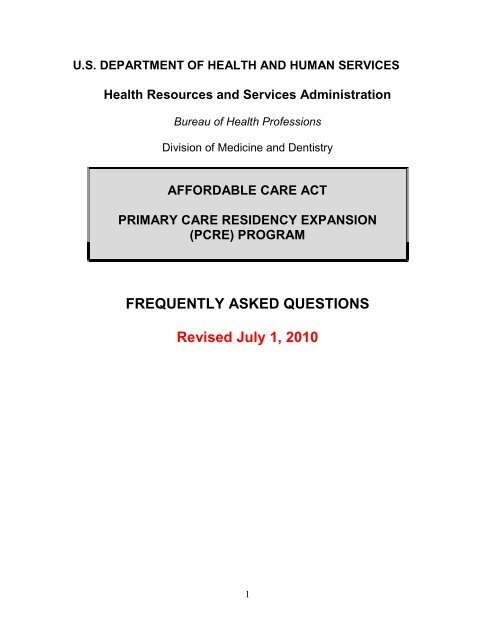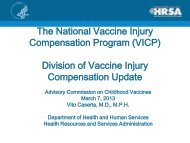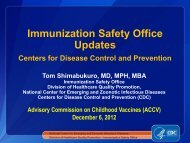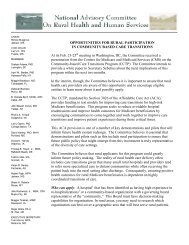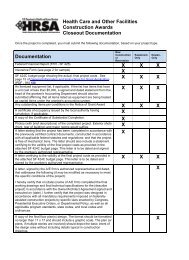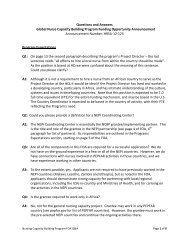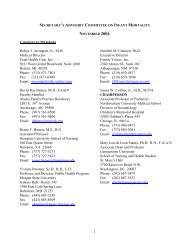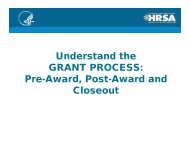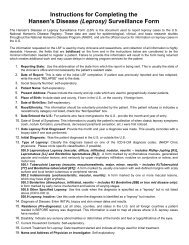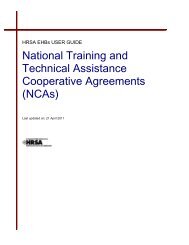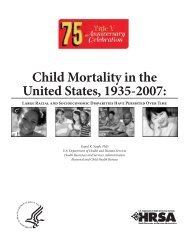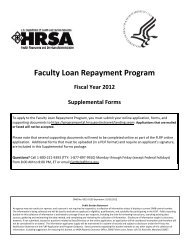Primary Care Residency Expansion (PCRE) Program - HRSA
Primary Care Residency Expansion (PCRE) Program - HRSA
Primary Care Residency Expansion (PCRE) Program - HRSA
Create successful ePaper yourself
Turn your PDF publications into a flip-book with our unique Google optimized e-Paper software.
U.S. DEPARTMENT OF HEALTH AND HUMAN SERVICES<br />
Health Resources and Services Administration<br />
Bureau of Health Professions<br />
Division of Medicine and Dentistry<br />
AFFORDABLE CARE ACT<br />
PRIMARY CARE RESIDENCY EXPANSION<br />
(<strong>PCRE</strong>) PROGRAM<br />
FREQUENTLY ASKED QUESTIONS<br />
Revised July 1, 2010<br />
1
AFFORDABLE CARE ACT<br />
PRIMARY CARE RESIDENCY EXPANSION (<strong>PCRE</strong>) PROGRAM<br />
Frequently Asked Questions<br />
Purpose.........................................................................................................................................3<br />
Summary of Funding...................................................................................................................3<br />
Eligibility……………………………………………………………………………………………………5<br />
Eligible Use of Funds (Revised July 1, 2010).……………………………………………………….7<br />
Reporting......................................................................................................................................9<br />
2
Purpose<br />
What is the purpose of the Affordable <strong>Care</strong> Act <strong>Primary</strong> <strong>Care</strong> <strong>Residency</strong> <strong>Expansion</strong> (<strong>PCRE</strong>)<br />
program funding opportunity?<br />
The program’s purpose is to increase the number of primary care physicians by expanding<br />
enrollment in accredited primary care residency programs (family medicine, general internal<br />
medicine, and general pediatrics). The new residency training positions must be over and above<br />
the number currently (i.e., July 1, 2010) being trained, even if a program is already over its<br />
Centers for Medicare and Medicaid Services (CMS) authorized GME cap.<br />
Summary of Funding<br />
How much funding is available?<br />
The ACA-<strong>PCRE</strong> <strong>Program</strong> will provide $168 million in funding for Federal fiscal years 2010<br />
through 2014. All funding will be provided in FY 2010, at the time of the award, but there will be<br />
limitations on the amount of funds that can be drawn down each year. The program has a five<br />
year budget and project period which begins on September 30, 2010 and ends on September 29,<br />
2015. Funding is provided at $80,000 per resident per year, minus authorized program expenses<br />
(including indirect costs) as outlined in the funding opportunity announcement, for a total of three<br />
years per resident.<br />
Are there funding priorities to be used in ranking applications to be funded?<br />
Yes. The program has an administrative funding priority. To meet the program funding priority, a<br />
minimum of six months of the resident’s three-year training experience must be provided in a<br />
community-based, clinical rotation in one or more of the following types of providers:<br />
1. Rural Health Clinic<br />
2. Community Health Center<br />
3. Sole Community Hospital<br />
4. Critical Access Hospital, or<br />
5. Other Community Based Settings<br />
The rotation(s) may be a single six month community-based clinical rotation or a combination of<br />
community-based clinical rotations across multiple community based settings over the three<br />
years of residency. To apply for the funding priority, an applicant must (1) request it and (2)<br />
attach documentation to justify the request.<br />
How do eligible entities apply for ACA-<strong>PCRE</strong> funds?<br />
Funding opportunity announcement <strong>HRSA</strong>-10-277 is currently open, and will close in both<br />
Grants.gov and <strong>HRSA</strong>’s Electronic Handbooks on July 19.<br />
When will the grant be awarded?<br />
ACA-<strong>PCRE</strong> funds will be awarded in September 2010.<br />
Is there any formal notification of an ACA-<strong>PCRE</strong> award from the Health Resources and<br />
Services Administration (<strong>HRSA</strong>)?<br />
Yes. <strong>HRSA</strong> will electronically transmit a formal notification in the form of a Notice of Grant Award<br />
(NGA) that will be provided to the ACA-<strong>PCRE</strong> applicant organization/institution.<br />
3
Who evaluates the applications and determines which are given grant awards?<br />
The evaluation is done through a peer review process. Each application is reviewed, discussed,<br />
and scored in terms of the five criterion listed in the funding opportunity announcement. If an<br />
applicant requests and meets the funding priority, five additional points are given. All applicants<br />
will receive a summary statement from the peer review panel listing strengths and weaknesses of<br />
the application.<br />
Will the conference call on June 25 be available?<br />
Yes, the call was recorded and will remain available until 5:00 p.m. ET on the closing date of July<br />
19, 2010 by calling 1-800-294-6358.<br />
4
Eligibility<br />
Who are eligible entities for this funding opportunity?<br />
Eligible applicants include public or nonprofit private hospitals, schools of medicine or osteopathic<br />
medicine, or a public or private nonprofit entity with which the Secretary has determined is<br />
capable of carrying out such grants. To receive grant funds, an applicant must be accredited as a<br />
residency training program in family medicine, general internal medicine or general pediatrics by<br />
the Accreditation Council for Graduate Medical Education (ACGME) or by the American<br />
Osteopathic Association (AOA). The applicant must provide a statement that they are accredited,<br />
and must name their accrediting body and date of accreditation for verification purposes.<br />
Submission of accreditation letters is not required.<br />
Can we submit more than one application?<br />
Eligible applicants may submit one application for each discipline they support, but may only<br />
request support for one discipline per application.<br />
Our residency program trains in a for-profit hospital. Are we still eligible to apply?<br />
Yes. The eligible grantee can be a public or private nonprofit entity, such as a residency<br />
program. In addition, schools of medicine and public or nonprofit hospitals may apply. The<br />
applicant must be an accredited residency training program in family medicine, general internal<br />
medicine, or general pediatrics.<br />
We do not have accreditation for the new expanded residency positions. Can we apply?<br />
Yes. You will need to get ACGME or AOA approval for the new residency positions. Those slots<br />
will need to be accredited by the time you go to use the funds. Given that the funds are awarded<br />
in September 2010, you will have time to get accreditation for these expanded positions before<br />
applying funding that supports residents starting in July 2011.<br />
Is there a limit on the number of expanded residency positions for which we can apply?<br />
No. You will need to determine the number of residency positions over and above your current<br />
number for which you wish to request funding. The intent of the grant is that the number is one<br />
that can be realistically sustained after grant funding ends.<br />
If we want to expand our existing residency program by one position and maintain that<br />
addition each of the five years of the grant, what would be the total number of residency<br />
positions over five years for which we would request funding?<br />
The number for the first year would be 1. The second year would be 2 because you have the<br />
resident from the previous year plus a new resident. The third year would be 3. The fourth year<br />
would be 3 because you are starting a new resident but the resident from the first year has<br />
completed residency. Similarly, the number for the fifth year would be 3. So, it is 1-2-3-3-3. A<br />
total of 12 resident years of stipend support at $80,000 per year would be $960,000.<br />
The grant awards are to be made in September, but residents don’t start in September.<br />
How will that work?<br />
Yes, the funds are awarded in September 2010. They are to be used to support new residents<br />
starting in July 2011 who are filling the new positions that are an expansion over your current<br />
number of positions.<br />
5
If the intent of the program is to expand the training of primary care medical providers, are<br />
assurances that residents will go on to practice primary care required and how can that<br />
realistically be done?<br />
You are correct in that the intent of the <strong>PCRE</strong> program is to increase the number of residents<br />
trained in primary care and ultimately to increase the primary care workforce. While realistically<br />
complete assurances are not possible, applicants are urged to describe their efforts to select<br />
residents for these expanded positions who evidence a high degree of commitment to primary<br />
care practice once their residency is over.<br />
Are combined general internal medicine-general pediatrics residency programs eligible for<br />
a <strong>PCRE</strong> grant?<br />
No. Combined medicine-pediatrics residency programs, typically four-years in length, are not<br />
eligible for these grants.<br />
If we receive a <strong>PCRE</strong> grant, can we apply for future residency expansion funds from <strong>HRSA</strong>,<br />
such as a teaching health center award?<br />
Yes. Resident stipends supported with funds from the <strong>PCRE</strong> grant may also be supported by a<br />
percentage with other funding sources. In addition to State grants and institutional support, other<br />
sources include Federal education awards (fellowships, traineeships, etc.). The Teaching Health<br />
Center Initiative, which will be available sometime in the future, is considered a Federal education<br />
award.<br />
We are currently operating at our cap for residents. We understand we are extended an<br />
“exemption” from that cap if we are awarded a <strong>PCRE</strong> grant. If we are expected to maintain<br />
the new positions created by this program, we will then be over our allotted number of<br />
residents according to our current cap. What happens to that cap once the grant ends?<br />
Should you receive a <strong>PCRE</strong> grant, you wouldn’t be “exempt” from your cap, but rather you’d have<br />
a different source of funding (from <strong>HRSA</strong>) for these new residency positions. You still need to get<br />
ACGME or AOA approval for the new positions, as well as approval from your hospital. Once the<br />
grant ends, you will need to have a plan to continue to support these new positions. It may be<br />
possible at that point to apply for additional Medicare GME support and raise your Medicare cap.<br />
That is one possible plan to support these positions after the grant ends.<br />
6
Eligible Use of Funds<br />
Are there Maintenance of Effort requirements for applicants?<br />
Yes. The applicant must include a statement in the budget narrative indicating that “Federal<br />
funds will not replace current sources of support for proposed grant activities.”<br />
Are there limitations placed on the funding of this program?<br />
This program only includes funding for primary care residency stipends in accredited family<br />
medicine, general internal medicine and general pediatrics programs. Funding for residents must<br />
be $80,000 per year per resident and should be awarded on a yearly basis for three years per<br />
resident. Indirect costs, resident travel, fringe benefits, and other costs related to funding an<br />
additional resident in the program are allowed but must be accounted for in the $80,000 funding<br />
level per resident.<br />
Who are eligible residents?<br />
To be eligible for stipend support, a resident must be in an accredited primary care residency<br />
program; a citizen of the U.S., a non-citizen national, or foreign national who possesses a visa<br />
permitting permanent residence in the U.S., and must plan to complete the residency program<br />
and work in or teach in the applicable primary care discipline.<br />
[new 7/1/2010]<br />
An International Medical Graduate (IMG) is eligible for stipend support if:<br />
(1) He/she has a copy of the Educational Commission of Foreign Graduates (ECFMG)<br />
certificate, and<br />
(2) He/she has a copy of a Foreign Graduate Medical Exam in Medical Sciences<br />
(FMGEMMS) certificate, or<br />
(3) He/she has a certificate of successful completion of the United States Medical<br />
Licensing Examination (USMLE) Parts 1 & 2.<br />
Can students be supported partially with other funding sources?<br />
Yes. Resident stipends supported with funds from this grant program may also be supported by<br />
a percentage with other funding sources, including State grants, institutional support and/or other<br />
sources including Federal education awards (fellowships, traineeships, etc.) but not for<br />
educational assistance under the GI Bill, Medicare or Medicaid funding.<br />
Are indirect costs authorized?<br />
Yes, but they must be accounted for within the authorized award amount per student of $80,000.<br />
In addition, note that indirect costs under training grants to organizations other than state, local or<br />
Indian tribal governments will be budgeted and reimbursed at 8 percent of modified total direct<br />
costs rather than on the basis of a negotiated cost agreement, and are not subject to upward or<br />
downward adjustment.<br />
Can salaries be paid out of this grant funding?<br />
No. This program funds primary care resident stipends, travel, fringe benefits and grantee<br />
indirect costs. Personnel, staff, consultant costs, equipment, supplies and subcontracts are<br />
prohibited under this grant award.<br />
7
The residency program is 3 years but the grant is for 5 years. How does that work?<br />
The residents starting in years one, two, and three of the grant will receive support for all three<br />
years of their residency. Residents starting in year four will receive two years of grant support<br />
and the residents starting in year five will receive one year of grant support. Your application<br />
should indicate what funds (other than this grant) will be used to support residents who start in<br />
years four and five so that they complete an entire three year residency. That type of discussion<br />
needs to occur at your institution before deciding whether or not to apply for a <strong>PCRE</strong> grant. Your<br />
application should clearly delineate your institution’s funding commitment once the grant ends.<br />
At the end of the <strong>PCRE</strong> grant, can we continue to support these new resident slots with<br />
Medicare GME funding?<br />
Yes. If your hospital is eligible for Medicare GME slots and funding, <strong>PCRE</strong>-supported resident<br />
positions can be supported by Medicare GME at the end of the grant period. However, these<br />
resident positions cannot be funded by BOTH Medicare GME and <strong>PCRE</strong> grant support at the<br />
same time.<br />
How will ACA-<strong>PCRE</strong> funding be delivered to grantees?<br />
Grantees will receive ACA-<strong>PCRE</strong> funds much in the same way schools get their current <strong>HRSA</strong><br />
funding via the PMS; a NGA will be issued under a different grant number. For information<br />
regarding the drawdown of your awarded funds, contact your account representative at 1-877-<br />
614-5533 or http://www.dpm.psc.gov/. Grantees should drawdown funds based on the needs of<br />
the ARRA-<strong>PCRE</strong> project.<br />
8
Reporting<br />
Are there any special reporting requirements for these funds?<br />
All Bureau of Health Professions grantees are required to submit an annual two-part progress<br />
report. The first part demonstrates grantee progress on program-specific goals. The second part<br />
collects core performance measurement data to measure the Bureau’s progress through its<br />
grantees in: (1) improving the distribution, diversity, and quality of the healthcare workforce, (2)<br />
improving the educational environment infrastructure, and (3) increasing students’ selection of<br />
primary care education. Awarded projects will receive further information on data submission.<br />
More details can also be found on pages 26-28 of the Funding Opportunity Announcement.<br />
<strong>HRSA</strong> encourages, but doesn’t require, programs to follow their graduates for more than the first<br />
year after program completion to evaluate the effectiveness of their training program in producing<br />
graduates who provide high quality, culturally and linguistically appropriate (primary) care to<br />
underserved populations. The Affordable <strong>Care</strong> Act authorizes <strong>HRSA</strong> to fund such longitudinal<br />
evaluations by its grantees. <strong>HRSA</strong> anticipates establishing guidelines for these evaluations in the<br />
coming year and requesting applications from existing grantees to conduct evaluations (pending<br />
availability of appropriations for this activity).<br />
9


